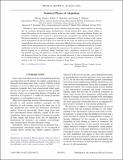Statistical Physics of Adaptation
Author(s)
Perunov, Nikolay; Marsland, Robert Alvin; England, Jeremy L.
DownloadPhysRevX.6.021036.pdf (1.092Mb)
PUBLISHER_CC
Publisher with Creative Commons License
Creative Commons Attribution
Terms of use
Metadata
Show full item recordAbstract
Whether by virtue of being prepared in a slowly relaxing, high-free energy initial condition, or because they are constantly dissipating energy absorbed from a strong external drive, many systems subject to thermal fluctuations are not expected to behave in the way they would at thermal equilibrium. Rather, the probability of finding such a system in a given microscopic arrangement may deviate strongly from the Boltzmann distribution, raising the question of whether thermodynamics still has anything to tell us about which arrangements are the most likely to be observed. In this work, we build on past results governing nonequilibrium thermodynamics and define a generalized Helmholtz free energy that exactly delineates the various factors that quantitatively contribute to the relative probabilities of different outcomes in far-from-equilibrium stochastic dynamics. By applying this expression to the analysis of two examples—namely, a particle hopping in an oscillating energy landscape and a population composed of two types of exponentially growing self-replicators—we illustrate a simple relationship between outcome-likelihood and dissipative history. In closing, we discuss the possible relevance of such a thermodynamic principle for our understanding of self-organization in complex systems, paying particular attention to a possible analogy to the way evolutionary adaptations emerge in living things.
Date issued
2016-06Department
Massachusetts Institute of Technology. Department of PhysicsJournal
Physical Review X
Publisher
American Physical Society
Citation
Perunov, Nikolay; Marsland, Robert A. and England, Jeremy L. "Statistical Physics of Adaptation." Physical Review X 6, 021036 (June 2016): 1-12 © 2016 Published by the American Physical Society
Version: Final published version
ISSN
2160-3308